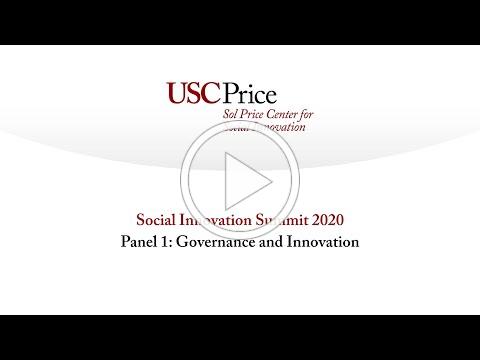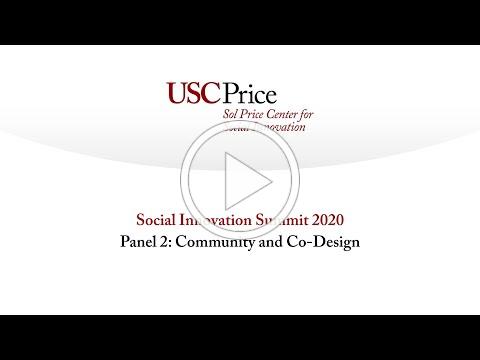Dear Friends:
Over the past month, we have continued our work to support community partners by providing data on how COVID-19 is impacting communities across Los Angeles County. You can reference our work on the NDSC COVID-19 map and read our latest data story on this topic below.
Additionally, the pandemic has exacerbated the economic disparities that previously existed in our region. I recently developed a blueprint for rental market stabilization to assist in navigating the current climate and our economic recovery, which you can also read below.
As you read these updates and other items from our newsletter, I welcome your feedback and ideas for innovative approaches to tackling the complex issues of this time. I can be reached directly at gpainter@usc.edu if you would like to connect.
Best,
|
|
Gary Painter
Director, USC Price Center for Social Innovation
Director, Homelessness Policy Research Institute
|
|
A Blueprint for Rental Market Stabilization
by Price Center Director Gary Painter
|
|
One of the many markets that have been destabilized
by the economic shutdown is the rental market.
Even though missed payments in April, May, and June have not been as many as feared, the pending uncertainty associated with mounting job losses has increased concerns for tenants, landlords, and creditors. Policymakers around the country acted swiftly and prudently to ensure that tenants forced out of a job due to COVID-19 would not be kicked out of their home. Research on both eviction and foreclosure moratoria suggest that a pause is a good first step to stabilizing both rental and owner-occupied housing markets. But landlords are getting restless, and have filed suit over Los Angeles’ eviction moratorium. We need a plan for stabilizing the rental market. Unfortunately, unrestricted rental assistance to tenants or landlords, such as the $100 Billion in the Heroes Act is not a plan. It simply provides some promise of assistance without a strong link to long term stabilization in the market.
Policymakers must develop a “Blueprint for Rental Market Stabilization” that prevents the dire outcomes for renters and landlords alike that would result from mass evictions or personal bankruptcies filed by tenants. If we delay in providing a clear plan now, then tenants, landlords, and creditors will continue to make haphazard decisions in the face of an unknown future.
|
|
Dreams of the Overworked:
Living, Working, and Parenting in the Digital Age
New Book co-authored by Dr. Christine Beckman
|
|
Professor Christine Beckman, Associate Director of the Price Center, Price Family Chair in Social Innovation, and Professor of Public Policy, and co-author Melissa Mazmanian, have written a new book called Dreams of the Overworked: Living, Working and Parenting in the Digital Age. It is an ethnographic account of working parents’ efforts to be Ideal Workers, Perfect Parents, and Ultimate Bodies. The book highlights how technology intensifies these myths of perfection, celebrates the people who actually do the work of scaffolding the dreams of those around them, and reveals the hidden sources of gender inequality in everyday life. |
|
Museums as Classrooms: The Academic and Behavioral Impacts of “School in the Park”
by Johanna Lacoe, Gary D. Painter, Danielle Williams
|
|
Access to community cultural institutions such as museums, zoos, and theaters has the potential to improve students’ educational experiences. This article estimates the impact of School in the Park, a museum-based educational program for low-income students that takes place within the cultural institutions and museums of San Diego’s Balboa Park. We identify the impact of participation in the program on short- and long-term academic and behavioral outcomes using longitudinal, student-level data since 1996; natural variation in the timing of program implementation at two elementary schools; and control groups of students from schools that did not receive the program. Findings indicate that participation in the program has positive short-term impacts, but program impacts were insignificant in the long run. |
|
State and Local Aid for Immigrants
During the COVID-19 Pandemic: Innovating Inclusion
New Report by Roberto Suro and Hannah Findling
|
|
State and local governments have exercised unusual powers since the early days of the Coronavirus lockdowns, ordering businesses to open and close, the wearing of masks, and much else. Amidst it all, renewed activism on immigration issues in some parts of the country has produced measures that offer emergency economic relief and access to health care for immigrants left out of federal programs, especially the undocumented. In other cases, governments have facilitated employment by immigrants considered “essential” from surgeons to farmworkers. These efforts are potentially significant as experiments that could pave the way for broader policy change in the long run. |
|
Race, Stress and Poverty:
Health Inequities in Spread of COVID-19
by NDSC in partnership with KCET
As the number of new COVID-19 cases continues to increase across California and the U.S., Los Angeles has become the state’s hardest-hit county. The health and economic consequences of the pandemic have not affected all communities across the county equally.
|
|
View COVID-19 cases in Los Angeles County by
neighborhood, race/ethnicity, and over time here.
|
|
CHRISTINE M. BECKMAN
PAST EVENTS:
36th EGOS Colloquium
July 2-4, 2020
Professor Beckman spoke on Distributed experimentation in response to grand challenges: Pursuing alternative solutions to global displacement at this virtual conference along with Marian Konstantin Gatzweiler and Corinna Frey-Heger.
|
|
ANN OWENS
GRANT APPROVAL:
"The Segregation Lab: Building Research Capacity for Addressing Inequality"
by Ann Owens and Sean Reardon (Stanford)
The Russell Sage Foundation has funded a proposal submitted by Ann Owens and Sean Reardon (Stanford) to create an online data archive for neighborhood and school segregation. The goal of this project is to provide one comprehensive database that researchers, policymakers, and the public can access to review data, high-quality segregation measures, and interpretation guides.
|
|
“You’ve Been Set Up to Fail”:
What Modern Parents Face is Nearly Impossible
|
Written by Matt Berical
Fatherly
|
|
What America Asks of Working Parents Is Impossible |
Written by Joe Pinsker
The Atlantic
|
|
Even Before Pandemic, Working Parents Struggled To Achieve The ''Dreams Of The Overworked'' |
Podcast hosted by Tonya Mosley and Samantha Raphelson
"Here & Now"
|
|
Ep. 170. Christine Beckman: Living, Working and Parenting in the Digital Age |
Podcast hosted by Stew Friedman
"Work and Life with Stew Friedman"
|
|
Developers Love The OZ Program. But Are They Delivering On Its Social Mission? |
Written by Joseph Pimentel
Bisnow Southern California
|
|
Apple spends $400M to fight California housing crisis |
Written by Evie Fordham
FOXBusiness
|
|
ONGOING AT THE PRICE CENTER |
|
Our Commitment
TO ANTI-RACIST VALUES
|
In the wake of our nation’s call to dismantle systemic racism in our society, the Price Center is redoubling our commitment to embedding anti-racist values in all of the work that we do. Policy and systems change is necessary to address the deep-rooted structural inequities. |
|
COVID-19
NDSC COVID-19 DATA MAP
|
Our map will help our community better understand where cases of COVID-19 exist within the county, as well as the underlying vulnerabilities faced by Los Angeles residents. It is updated daily with information from the LA County Department of Public Health. |
|
August
NDSC Community Training
|
Wednesday, August 19
12:00pm - 1:00pm PST
|
|
September
NDSC Community Training
|
Wednesday, September 16
12:00pm - 1:00pm PST
|
|
For more information on events, please email Events & Administrative Coordinator
Stacia Fewox at stacia.fewox@usc.edu.
|
|
The USC Price Center for Social Innovation develops ideas and illuminates strategies to improve the quality of life for people in low-income urban communities. |
|
LEARN MORE ABOUT THE CENTER
Contact Megan Goulding, Director of External Relations,
(213) 821-1761 or mgouldin@usc.edu.
Visit socialinnovation.usc.edu to explore our current research and events,
and follow us on Twitter and Facebook!
|
|
|
|
|
|
|








 Arts and Entertainment
Arts and Entertainment Business and Industry
Business and Industry Computer and Electronics
Computer and Electronics Games
Games Health
Health Internet and Telecom
Internet and Telecom Shopping
Shopping Sports
Sports Travel
Travel More
More